Results 871 to 880 of 1857
Thread: Âu
-
03-29-2020, 03:37 PM #871
Băn khoăn xứ đạo!
German churches overcoming coronavirus isolation
With Germany in lockdown, pastors and priests are looking for new ways to reach the country's 3 million regular worshippers. Elderly churchgoers are especially in need of pastoral care.
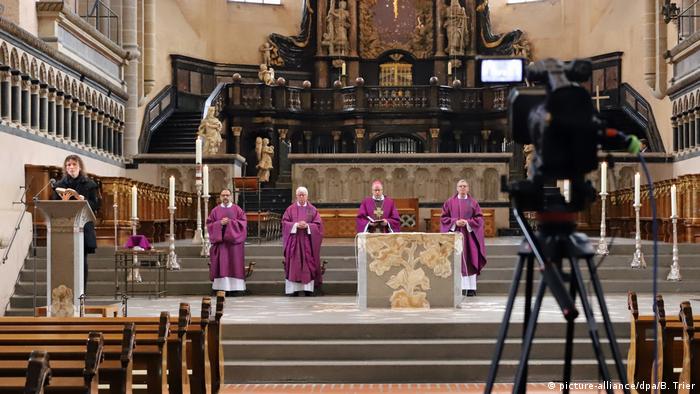
"We were overwhelmed, at all levels," said Selma Dorn, a vicar at the Evangelical Reformed Church in Leipzig. "Pastoral care happens on all levels, with every conversation."
The 29-year-old, like much of Germany's religious community, has been struggling to adapt to life under lockdown in Germany, with churches and other religious institutions closed to help stop the spread of the COVID-19 outbreak.
Dorn heard about the new restrictions on everyday life just ahead of a regular women's coffee meetup, where 10 of the usual participants were over 75 years old. "We struggled for a long time over the decision to cancel the meeting," she told DW.
But in the end, the meeting was called off, and Dorn began making the calls. Some of the conversations lasted just a few minutes, while others went on for an hour. For some of the women, the meetup is the only time they have contact with the outside world, "a fixed point" in their life, said Dorn.
'Daily church life has been suspended'
Since that day two weeks ago, the phone has been Dorn's most important tool, as it has been for thousands of other religious leaders.
"Our previous routine, the daily church life, has been suspended," said Christoph Wichmann, a Catholic priest in the western city of Oberhausen near Düsseldorf.
Instead of celebrating Mass, working with youth or meeting with various associations, now most days are spent on the phone and "answering 25 to 30 emails a day."
Wichmann usually celebrates Mass at St. Pankratius every day. Of the two or three dozen faithful in attendance, a good half are elderly. It's only recently become clear to Wichmann that he may not see some of them alive again.
But he continues to connect by phone, speaking and praying with his parishioners. And every evening at 7 p.m., he places a lit candle in his window at home and says the Lord's Prayer.
Postcards, singalongs, streaming services
Many communities now ring the church bells every day, send out newsletters or postcards, encourage volunteers to shop for the elderly and organize phone chains to fight off loneliness.
Live online singalongs are becoming a popular way to connect, and religious leaders everywhere are streaming their services on Facebook, Twitter or Instagram — among them Pope Francis, Cardinal Christoph Schönborn in Vienna and Cologne's archbishop, Rainer Maria Woelki.
But, said Wichmann, "many parishioners have also asked for something more personal." Online services are well and good, "but people also want to see their own familiar church, hear the bells, listen to the priest they know. That is incredibly important," he said. In response, the four Catholic parishes in Oberhausen have each decided to alternately broadcast one Mass every Saturday evening.
Social media togetherness
Thomas Gäng, chairman of the Oberhausen Catholic Council, relies on these online services; he's been in quarantine after contact with an infected person.
"What I've missed was the celebration of the Eucharist. I really felt that void," he said. For Gäng, participating in Mass feels "as if Jesus Christ is hugging me. That's why going without the Eucharist is so difficult."
But he appreciates the new signs of faith: the candles in the windows, the online worship services from the Oberhausen parishes. And he's amazed that they've already racked more than a thousand views on Facebook and YouTube.
In Leipzig, Selma Dorn has also been turning her attention to social media: Instagram stories for the younger crowd, Facebook for the 30 to 60-year-olds. But for her and Wichmann, the phone remains a crucial link to their elderly members.
"Many have asked me to bring them a palm branch from Palm Sunday, or for a small Easter candle," said Wichmann. "Somehow, we'll find a way to bring it to them."
/* src.: https://www.dw.com/en/german-churche...ion/a-52948932

 Puck Futin
Puck Futin
-
03-29-2020, 03:41 PM #872
Thụy Điển, xứ lạnh tình gần
Coronavirus pandemic not keeping Swedish residents at home
The streets of Stockholm are quiet but not deserted amid the coronavirus outbreak.
People still sit at outdoor cafes in the centre of Sweden’s capital. Vendors still sell flowers. Teenagers still chat in groups in parks. Some still greet each other with hugs and handshakes.
After a long, dark Scandinavian winter, the coronavirus pandemic is not keeping Swedes at home even while citizens in many parts of the world are sheltering in place and will not find shops or restaurants open on the few occasions they are permitted to venture out.
Swedish authorities have advised the public to practise social distancing and to work from home, if possible, and urged those over age 70 to self-isolate as a precaution.
Yet compared to the lockdowns imposed elsewhere in the world, the government’s response to the virus allows a liberal amount of personal freedom.
Standing at bars has been banned in Sweden, but restaurant customers can still be served at tables instead of having to take food to go.

People sit at outdoor cafes in the centre of Sweden’s capital (David Keyton/AP)
High schools and universities are closed, but pre-schools and primary schools are still running classes in person.
“Sweden is an outlier on the European scene, at least,” said Johan Giesecke, the country’s former chief epidemiologist and now adviser to the Swedish Health Agency, a government body.
“And I think that’s good.”
Other European nations “have taken political, unconsidered actions” instead of ones dictated by science, Mr Giesecke asserted.
It remains unclear how long Sweden’s exceptional state will last.
Prime Minister Stefan Lofven, warning of “many tough weeks and months ahead”, announced on Friday that as of Sunday, gatherings would be limited to 50 people instead of 500.
The government noted that weddings, funerals and Easter celebrations would be affected.
Still, to reduce the spread of the virus in Germany and the UK, groups larger than two are currently prohibited unless they are composed of people who already live together.
Officials in Italy and France introduced increasingly restrictive limits on public activities and eventually authorised fines because they said too many people ignored social-distancing recommendations.
For now, the Swedish government maintains that citizens can be trusted to exercise responsibility for the greater good and will stay home if they experience any Covid-19 symptoms.
Many Swedes are indeed keeping the recommended distance from others.
Victoria Holmgren, 24, praised the Swedish government’s handling of the public health crisis as “very good”.
“And it’s partly because I don’t think I could manage being inside the whole day,” Ms Holmgren said.
But some scientists have criticised the Swedish Public Health Agency’s approach as irresponsible during a worldwide pandemic that has already killed over 21,000 people in Europe.
In an open letter to the government, some 2,000 academics called for greater transparency and more justification for its infection prevention strategy.
Sten Linnarsson, a professor at Karolinska Institute, a prominent medical university in Sweden, said the concern centres on “the assessments and the course that the Swedish government has taken through this epidemic, and especially because there is really a lack of scientific evidence being put forward for these policies”.
Mr Linnarsson compared Sweden’s handling of the virus to letting a kitchen fire burn with the intent of extinguishing it later.
“That doesn’t make any sense. And the danger, of course, is that it burns the whole house down,” he said.
Sweden’s current chief epidemiologist, Anders Tegnell, argued that even if the country’s comparatively permissive policies are an anomaly, they are more sustainable and effective in protecting the public’s health than “drastic” moves like closing schools for four or five months.
Sweden, a nation of 10 million, had a total of 3,447 confirmed virus cases and 105 deaths by Sunday, according to a Johns Hopkins University tally. However, there has been limited testing, with some 24,500 tests conducted by Wednesday, according to official statistics.
“The goal is to slow down the amount of new people getting infected so that health care gets a reasonable chance to take care of them. And that’s what we all do in every country in Europe,” Mr Tegnell said. “We just choose different methods to do it.”
Susanna Moberg, a 63-year-old retired teacher, said she trusted the government and also believes Sweden’s experience with the virus will not be as dire as Italy’s, which has by far the most virus-related deaths in the world at more than 10,000.
“I’m not so worried. I’m not 70 years yet. And my children are not sick so we will go to a restaurant on Sunday,” Ms Moberg said.
“We said ‘Everybody is well and the restaurant is open’. So we will go there to celebrate. We can’t stay at home the whole day, all week."
/* src.: https://www.eveningexpress.co.uk/new...dents-at-home/

 Puck Futin
Puck Futin
-
03-30-2020, 02:50 PM #873
Chuyện trai gái thời loạn: Tình nồng "Đức - Đan".
Love in coronavirus times: Couple meets for dates on closed Danish-German border
Inga lives in Denmark. Karsten lives in Germany. Despite the coronavirus pandemic, they have not been deterred from meeting each other every day at the border — keeping a safe distance, of course.
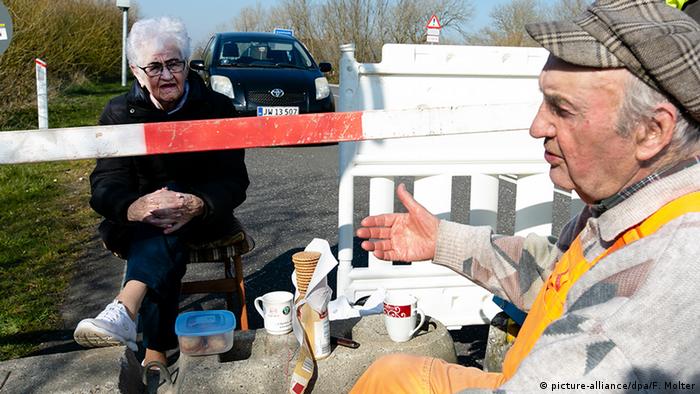
Inga lives in Denmark. Karsten lives in Germany. The border between Germany and Denmark is now almost completely closed due to the worsening situation in both countries from the coronavirus outbreak. However, this hasn't deterred their love.
Each day, Inga Rasmussen, 85, and Karsten Tüchsen Hansen, 89, meet each other at the border to chat, eat lunch or share some biscuits and have a flask of coffee or Geele Köm — a popular spirit from the region.
"Cheers to the love," said Hansen as they toasted each other.
Normally they would embrace, kiss and hug. But now they must keep their distance.
The two sit on either side of the red-and-white barrier marking the border — on chairs they have brought with them from home. The pair have been meeting up every day at the closed border crossing at Aventoft.
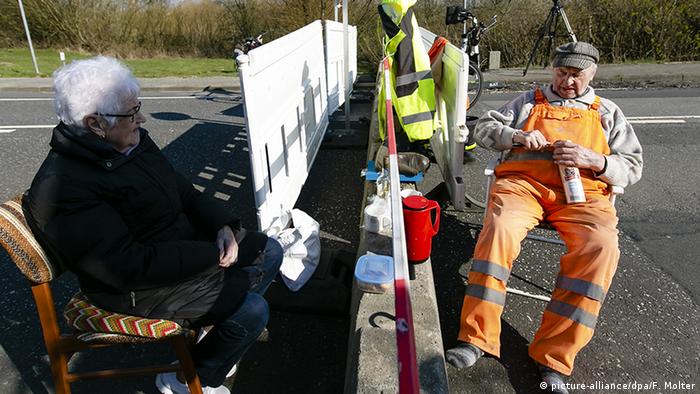
Inga and Karsten are hoping to travel again when the restrictions are lifted
Love knows no borders
Hansen lives in Süderlügum in Germany's Nordfriesland region, Rasmussen in the Danish town of Gallehus.
Hansen rides his e-bike from Süderlügum to his afternoon dates. Rasmussen drives her car to the border.
On March 14, Denmark closed large parts of the border to the German border state of Schleswig-Holstein. Two days later, Germany followed suit.
"It's sad, but we can't change it", said Rasmussen. The pair has frequently talked over the phone since the border closure and try their best to meet every day, not letting the pandemic affect their relationship.
The couple met two years ago purely by chance, they explained. Since March 13 last year, they have spent every day together.
"I am otherwise always with Karsten," said Rasmussen. But the time in between is already long, when you're alone, she added.
The couple hopes that by Easter they can visit each other again. They have also made plans for the future. When the restrictions are lifted —they would like to travel again.
/* src.: https://www.dw.com/en/love-in-corona...der/a-52951701

 Puck Futin
Puck Futin
-
03-30-2020, 02:58 PM #874
Đồ lô.
Coronavirus: Netherlands recalls 'defective' masks bought from China
Hundreds of thousands of masks sent to Dutch hospitals have been recalled after tests showed they failed to protect the face or had defective filters. The Netherlands recently bought 1.3 million masks from China.
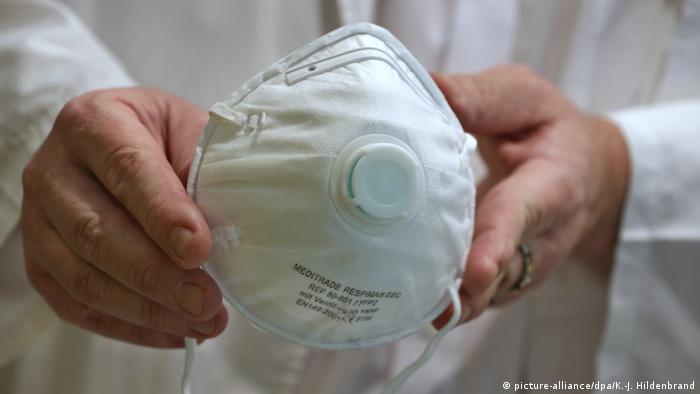
The Dutch government has ordered a recall of around 600,000 masks out of a shipment of 1.3 million from China after they failed to meet quality standards.
The defective masks had already been distributed to several hospitals currently battling the COVID-19 outbreak, news agency AFP and Dutch media reported. The Dutch Health Ministry has kept the rest of the shipment on hold.
An inspection revealed that the FFP2 masks did not protect the face properly or had defective filter membranes. The fine filters stop the virus from entering the mouth or nose. The masks failed more than one inspection.
(more)

 Puck Futin
Puck Futin
-
03-30-2020, 03:19 PM #875Đồ ngoại mà. Ba Tàu nhận về xong bán rẻ cho Trâm vác về bổ mối cho dân Mỹ xài.Đồ lô.
-
03-30-2020, 03:20 PM #876
Trang lệnh! Người Áo đi đầu trong trang phục là phải đạo rồi!
Austria to make basic face masks compulsory in supermarkets
VIENNA (Reuters) - Austria will require shoppers to wear basic face masks in supermarkets in a bid to slow the still too-rapid spread of the coronavirus, Chancellor Sebastian Kurz said on Monday.
Austria has closed schools, restaurants, bars, theatres and other gathering places, including non-essential shops. People have been told to stay at home and work from there if possible.
...
The country has reported 108 deaths and more than 9,000 cases, fewer than its neighbours Italy and Switzerland and within its health system’s capacity so far, but Kurz told a news conference its intensive care capacity could be exceeded by mid-April.
The rate of infection remains “far too high”, Kurz said, adding that less than medical-grade masks would be distributed this week, probably from Wednesday.
“As of the moment, these masks are handed out in front of supermarkets it will be compulsory to wear them in supermarkets,” Kurz said, adding that the aim in the medium-term was for people to wear them in public more generally as well.
While the masks would not protect the wearer against infection, they would stop them sneezing or coughing on others and potentially infecting them, he added.
/*src.: https://www.reuters.com/article/us-h...-idUSKBN21H16A

 Puck Futin
Puck Futin
-
04-01-2020, 04:30 AM #877
Pan-European Privacy-Preserving Proximity Tracing (PEPP-PT)
Europe shares code for new coronavirus warning app
The software scans Bluetooth signals between mobile phones to detect when infections are possible.
By Janosch Delcker and Stephen Brown
4/1/20, 11:01 AM CET
Updated 4/1/20, 4:27 PM CET
BERLIN — European researchers think they have found a way to use mobile phones to contain the spread of coronavirus — and help people avoid infection — without sacrificing the region's high standards on privacy.
Eight countries have taken part in the project that will, on Wednesday, release the code for an app that analyzes Bluetooth signals between mobile phones to detect users who are close enough to infect each other, members of the group of about 130 academics, activists and technologists told POLITICO.
That data will be temporarily stored on the phones. If users later test positive for the virus, the app alerts anyone who has been around them in preceding days.
Unlike more invasive surveillance technology being used to track infections in parts of the world with lower standards of data privacy, the new European software embeds safeguards to encrypt data and anonymize personal information, according to some of the organizations involved, which include the Fraunhofer Heinrich Hertz Institute in Berlin and the Ecole Polytechnique Fédérale in Lausanne.
This makes it safe from abuse by third parties, including governments, and ensures data protection standards won't suffer irreparable damage as Europe tackles the pandemic.
“People have fought very hard to get where we are," said Chris Boos, the CEO of Berlin-based artificial intelligence company Arago, who is part of the project's leadership team and also advises Angela Merkel’s chancellery on digital policy. “And we shouldn't just throw our civilization out of the window."
Germany will be among the first countries to launch an app based on the code. That hasn't been officially confirmed, but Lothar Wieler, president of the Robert Koch Institute, which is coordinating Berlin's response to the pandemic, has hinted that his institute has teamed up with others to work on such a voluntary app. He told reporters during a press conference on Tuesday that, ideally, the entire German population would sign up to it.
Other countries in Europe could soon follow suit. The aim of releasing the code, Boos said, is to facilitate the launch of national apps across the region that can communicate with each other to pick up Bluetooth phone signals and help avoid infections.
Current members of the initiative, which is financed through donations, include organizations from Austria, Belgium, Denmark, France, Germany, Italy, Switzerland and Spain, but the initiative remains open for new countries to join, including from outside the Continent, he added.
“I think Europe is a very good starting place for this because we have this long tradition of privacy,” Boos said. “But of course, we're opening this up to other places, as well — and we already received the first requests from outside Europe when weren’t even out yet.”
Help Europe bounce back
The release of the Pan-European Privacy-Preserving Proximity Tracing (PEPP-PT) toolkit responds to pressure on political leaders to find ways to revive locked-down Europe's economy without prompting a spike in new cases of COVID-19, the disease caused by the coronavirus.
To do that, epidemiologists need better data on where infections take place so that those who might have contracted the pathogen can isolate themselves.
So far, countries like Germany have mostly tracked infections by interviewing those who are infected. But that workflow is lengthy and can be prone to errors, with patients often unable to remember everyone they crossed paths with in the preceding two weeks, the incubation period of COVID-19.
At the same time, patients tend to carry electronic devices with them that can track their whereabouts, prompting countries around the world to tap into that information to better identify new infections.
China, where the virus originated, has mobilized a vast array of mass surveillance tools, such as a mandatory app that scores individuals based on their contagion risk and shares the information with authorities.
But most Western democracies bristle at such invasive solutions, which privacy advocates warn would do lasting harm to society.
The advantage of PEPP-PT, according to its developers, is that downloading the app will be voluntary and the code makes it virtually impossible to reveal the identity of the people using the devices: Two phones will never exchange data directly, and the users' aliases are changed frequently.
Such privacy standards, they argue, make their technology different from solutions like an app launched in Singapore which also monitors the exchange of Bluetooth signals to detect when phone users are near one another.
The challenge is to convince enough people to install the app to make it an effective tool.
Epidemiologist Marcel Salathé, who heads a lab for digital epidemiology at EPFL, quoted research that in order to keep numbers of new infections down, ideally 60 percent of a population would use such technology.
But he also stressed that “in principle, already a few people [using the app would] help to make a difference,” not least because the scheme comes on top of other measures that are already implemented to slow down new infections.
“At the end of the day, if you have 40 percent of a population using such a system, that will still have a strong impact,” Salathé said.
/* src: https://www.politico.eu/article/euro...s-warning-app/

 Puck Futin
Puck Futin
-
04-01-2020, 01:58 PM #878
"Ngũ độc quốc"
Đức đang nằm ở "vị trí chiến lược", chưa biết ngày mai có vượt mặt tàu cho nó nể chưa.
Hiện tại báo chí đang rầm rộ soi con số rất ư nhẹ nhàng của TQ. Con số này cũng có thể
là con số rất ư "chiến lược" của tàu. Hạ thấp thống kê, khai man.
Làm gì thì làm, việc dân chúng bị lây và tử vong là chuyện có thật. Cho nên để tâm sức
chống dịch còn đỡ hơn ngó qua tàu cho mệt óc.

/* src: Đại học Hóp Kinh.
 Puck Futin
Puck Futin
-
04-03-2020, 03:30 PM #879
Prague removes statue of Soviet General Konev
A Soviet general's statue in Prague was removed by a local council, prompting protest from Moscow. Ivan Konev led the liberation of the Czech capital in 1945, but many Czechs criticize his crackdowns after World War II.
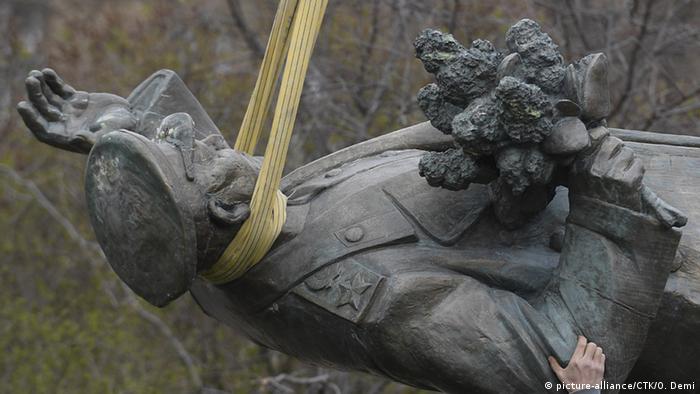
Prague's District 6 council used a crane Friday to implement its decision last September to remove a statue of Ivan Stepanovic Konev, a World War II commander, whose statue was erected in 1980.
Konev led Red Army forces who retook much of Eastern Europe from German Nazi forces in World War II, and was part of the liberation of Berlin and Prague in 1945.
He later, however, led the crushing of the anti-Soviet 1956 Hungarian Uprising and prepared the 1968 Soviet-led invasion of what was then Czechoslovakia.
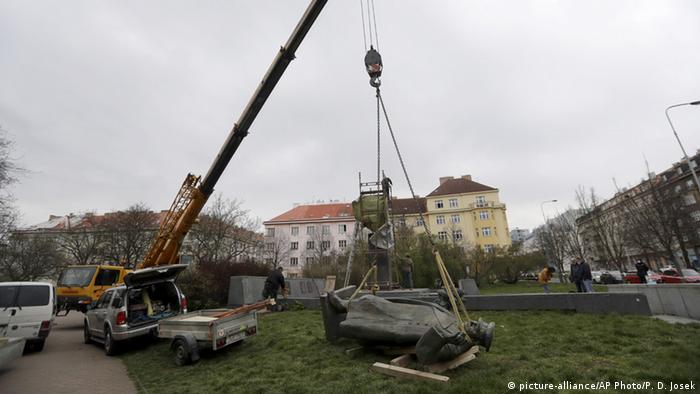
The decision to remove the statute was made in September, it came down on Friday
In 1961, during the construction of the Berlin Wall, he commanded Soviet forces in the communist then-East Germany.
On Friday, local Prague politician Ondrej Kolar declared: "Konev has been toppled, but Konev will stand again — only in the museum."
The statue was put in storage, said Kolar, for a planned Museum of the 20th century, which the Czech capital plans to open in the coming years.
Czech President Milos Zeman slammed the statute's removal, accusing Kolar's council of abusing the current coronavirus crisis, according to a presidential spokesperson.
Radio Prague also quoted Communist Party leader Vojtech Filip as describing the statue's disappearance from public view as disgraceful.
A heated debate over the Konev statue has raged for decades between supporters of 1945 Red Army liberation and those critical of his repressive roles later.
Last December the Prague Morning newspaper reported that "vandals" had slung a chain of sausages over the statue's arm.
Paint smears were also removed in the past. Last August last year some sprayed: "No to the blood-covered marshal, we shall not forget."
The local council's removal decision prompted an expression of indignation from the Russian Foreign Ministry, which on Friday spoke of an "unfriendly" act of "vandalism by unhinged municipal representatives."
ipj/sms (AFP, AP, dpa)
/* src: https://www.dw.com/en/prague-removes...nev/a-53010658

 Puck Futin
Puck Futin
-
04-05-2020, 03:02 PM #880
55 chưa chắc mình lành ...
Boris: “I shook hands with everybody, you’ll be pleased to know,” he said, “and I continue to shake hands.”
Coronavirus live news: Boris Johnson in hospital
(more)

 Puck Futin
Puck Futin






 Reply With Quote
Reply With Quote